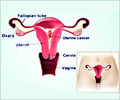- Scientists from Leuven Cancer Institute have identified a protein which is a potential biomarker for prognosis and therapy for patients with leiomyosarcoma.
- The protein was found in high grade tumors rather than in low grade tumors.
- The presence of the protein was associated with better response to PI3K/mTOR inhibitors.
Identifying the Protein Marker
The research team identified 5 proteins from 288 uterine sarcoma samples analyzed, which included- 157 leiomyosarcomas
- 52 benign uterine stromal tumors
- Endometrial sarcomas
- Adenosarcomas
- Certain other undifferentiated types of cancer
- 41 normal uterine tissues
- Shorter span of progression-free survival
- Disease-specific survival
Validation Studies
Human tumor fragments were implanted into mice by the research team to get five leiomyosarcoma patient-derived xenograft (PDX) models. These mice were then treated with PI3K/mTOR inhibitors and it was found that- The tumor shrunk in two xenograft mice models
- The tumor remained stable in the third model
- There was reduced growth of tumor in the fourth model
New Generation mTOR Inhibitors
Previous versions of mTOR inhibitors that were used in the treatment of uterine leiomyosarcoma targeted only certain active mTOR complexes with minimal response and were associated with increased toxicity. The Food and Drug Administration (FDA), therefore, did not approve these drugs. The scientists involved in the study used new-generation dual PI3K/mTOR inhibitors [BEZ235; dactolisib], which were found to have better efficacies when compared to the earlier ones. Dr. Amant added that the strong response obtained on using PI3K/mTOR inhibitors was rare for leiomyosarcomas. Research into development of drugs that had an acceptable level of toxicity was important to ensure safety.There are very few studies that are conducted on uterine sarcomas, as the disease is very rare. However, the disease grows rapidly and is difficult to treat, which makes it imperative to identify a method of treatment. Leiomyosarcomas occur less significantly, but the findings from the current study warrant further research into the use of PI3K/mTOR inhibitors against this disease.
The xenograft mice that were used in the study did not have a good immune system; therefore, immune responses to the treatment and toxicities could not be ascertained as a part of the study.
Uterine Carcinomas
About 95% of the cancers that occur in the uterus originate in the endometrium, called endometrial cancer. Uterine sarcomas constitute 2 to 5 % of all uterine carcinomas and originate from other tissues, like the muscles and tissues of the uterus that begin to grow at an abnormal rate. Other forms of uterine carcinomas include clear cell carcinoma, uterine papillary serous carcinoma and carcinosarcoma.- In the U.S, uterine cancer is the fourth most common cancer for women.
- Around 60,050 women in the United States are diagnosed with uterine cancer every year.
- An estimated 10,470 women die due to the disease every year.
- Uterine cancer is the sixth most common cause of cancer related death among women.
- The 5 year survival rate for uterine cancer is 82%.
- Leiomyosarcomas constitute 30% of all uterine sarcomas (National Cancer Institute).
- The 5 year survival rate for women with leiomyosarcomas is 50%.
- Uterine Sarcoma Facts - (https://www.seattlecca.org/diseases/uterine-sarcoma/uterine-sarcoma-facts)
















